
While many overseas students are able to work up to 20 hours per term on their visas, some are still struggling to find a job that fits their studies.
Navigating the UK job market may already be challenging and very competitive, but Manchester students are finding the busy nature of the city a further obstacle.
In the process of looking for work, many overseas students have experienced numerous rejections and feel that the 20 hours is an aggravating factor.
Esther Samuel, an international student in Manchester said: “It has not been easy, loads of rejections, people want staff that are more or less permanent, a couple of other people do not understand that as a student you are allowed to 20 hours”
For many students, their inability to find work is tied to the fact that international students in the UK are only able to work for 20 hours per week and a good number of employers are affected by this limitation.
Also, there is a need to balance study commitments and work expectations. Many students are expected have to attend lectures in the week and this would mean that they would have to find jobs that fit around their changing timetables without having to clash with work. This has also made it difficult for students to find employment.
For Oghenevwaire Vivian, it has been a struggle. she said: “It has not been easy honestly, among the thousands or even millions of applications I have sent out, only one has called me.”
In defense of not hiring students Bolton resident Mrs. Abiola Adeniran, an African store owner, said: “I’ve personally hired a number of students over the years, but they frequently miss work because they have a lot of schoolwork to complete, leaving me without an employee.”

According to statistics, over 75 percent of overseas students are employed in the UK overall, which suggests that graduates have a comparatively high degree of job attainment.
Compared to non-EU students, international students who were born in the EU have a greater employment rate in the UK.
Specifically, 47.1% of EU-born international students were employed, compared with 24.6% of non-EU-born students.
Even though the UK has a good overall employment rate, just 7% of international graduates are able to find graduate-level work, indicating that they encounter considerable barriers.
However, despite the high rejection rate, some international students believe that this has encouraged and inspired them to pursue additional experiences that will strengthen their resumes and better position them for the job market.
